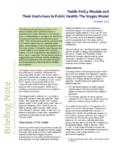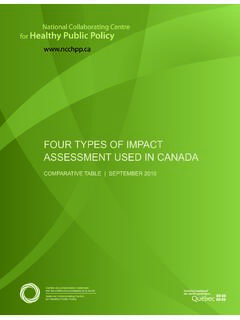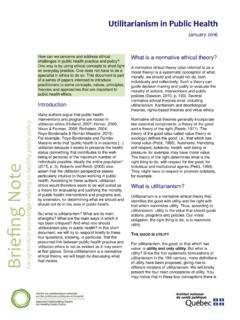Transcription of Public HealthEthics, EthicsFrameworksand Paternalism
1 Olivier Bellefleur & Michael KeelingNational Collaborating Centre for Healthy Public PolicyPublic HealthEthics, EthicsFrameworksand PaternalismBIE6000 | Universit de Montr al | November27, 2017 Declarationof real or potentialconflictsof interestPresenters:Olivier Bellefleur and Michael KeelingI have no real or potentialconflictof interestrelatedto the National CollaboratingCentres for Public Health3 National Collaborating Centre for Healthy Public Policy (NCCHPP)Our mandate Support Public health actors in their efforts to promote healthy Public policiesOur areas of expertise The effects of Public policies on health Generating and using knowledge about policies Intersectoralactors and mechanisms Strategies to influence policy making45 WebsiteWhatabout you?PlanThe NCCHPP sapproachto Public healthethics, and ourworkDiscussion: Ethicsframeworksfor Public health15-minute break (+/-5:15-5:30) Paternalism in Public health-introduction and deliberationfocusedon twocases7 Our approach Ethicsisone important dimension of informeddecision-making;8 Whatto do?
2 How to decide?Numerousfactorscanbeinvolvedin framing, motivating, influencing, informingand justifyingourresponsesto a the problem Acceptable to Public /decisionmakersFeasibilityLegal/re gulatoryenvironmentSocial status/privilegeInstitutionalculture/nor msCost-effectivenessEthics: analysisOrganizationalmandateProfessiona l standardsValuesBlind spots/biasesScientific+ otherevidenceYoursuggestions?Theseare justa few amongmany. All of theseare important and call for criticalattention. 9 Our approach Ethicsisone important dimension of informeddecision-making; Ethicalissues raisedby a policyor a population-wideintervention are differentfrominterpersonal/clinicalissue s; 10 Differentperspectives11 MicroMesoMacroAtwhatlevelshouldwelook?Th is person or patient?This family or group?This community?This institution?This policy?This political economy?Clinical Ethics?
3 Public HealthEthics?Wheretheytend to focus:Our approach Ethicsisone important dimension of informeddecision-making; Ethicalissues raisedby a policyor a population-wideintervention are differentfrominterpersonal/clinicalissue s; Public healthactorsare the experts in theirareas of specializationand theirdecision-makingcontexts;12 Our approach Ethicsisone important dimension of informeddecision-making; Ethicalissues raisedby a policyor a population-wideintervention are differentfrominterpersonal/clinicalissue s; Public healthactorsare the experts in theirareas of specializationand theirdecision-makingcontexts; Theyare not all specialistsin Public healthethics, but theydo have a practicalknowledgeof it;13 Our approach Ethicsisone important dimension of informeddecision-making; Ethicalissues raisedby a policyor a population-wideintervention are differentfrominterpersonal/clinicalissue s; Public healthactorsare the experts in theirareas of specializationand theirdecision-makingcontexts; Theyare not all specialistsin Public healthethics, but theydo have a practicalknowledgeof it; Wecanequipthem, informthemabout key concepts or but wedon thave the pretensionnorthe legitimacyto tell work: publications Principlism and Frameworksin Public Can We(and WhyShouldWe) Analyzethe Ethicsof PaternalisticPoliciesin Public Health?
4 Work: collectedand adaptedresourcesRepertoire EthicsFrameworksfor Public Public HealthEthicsFrameworksand VeryShort Case : workshops, webinarsand An online course Questions? Comments?17 Next: Ethicsframeworksfor Public health, an overview Questions Photo credit: Derek Bridges. Licence: to help us thinkabout ethicalissues in Public health?18 EthicaltheoriesCodes of ethicsValuesPrinciplesCasesFrameworksNot hingIntuitions?Whatisan ethicsframework?A frameworkisa guide thatcanhelp to highlightethicalvalues and issues, and serve as an aidto deliberationand providesan entry point and a structure for canguide specialistsin ethicsas wellas provides a common language for addressing issues and providesa lensfor lookingat, and therebyseeing, helpsto frame won tdo the workor the thinkingfor you. It won treplace yourowncriticalperspective (and a note of caution.)
5 A framework canproducecomplacency).It won teliminateyour cognitive and otherbiases, thoughif you deliberatein more diverse groups and use a framework, thismighthelp to by: Dawson, 2010, p. 192, 200. Manyare availablein boththe scientificand greyliteratures Also, thereare probablymanymore out therethathave been developedor adaptedfor use but thatare not publiclyavailable There are significantdifferencesamongthem Some willbebetteradaptedfor yourcontext/ organization/ community/ issue / policy/ to choosea framework? we want a general framework or one designed for a specific purpose?Scope:For anysituation:Kass, 2001 Marckmannet al., 2015 Filiatraultet al., 2015 For Public healthinterventions thatinfringeuponindividualautonomy:Upshu r, 2002 For obesityor overweightprevention: tenHave et al., 2012 For pandemicpreparedness: Thompson et al., 200621 Will webeevaluatingatthe levelof programs/policiesor situations involvingjusta few people?
6 22 MicroMesoMacroScale/perspective:More micro:More meso-macro:Focus more atpolicy/program/structural/ population/macro , Filiatraultet al., 2015, tenHave et al., 2012; Upshur, 2002 Focus more on whatto do atan individual/interpersonal/situation , WRHA, 2015 Are myvalues, thoseof myorganizationand thoseof the communitymore liberalor communitarian? Framing the issues:23 More liberal(emphasison individualautonomy)More communitarian(emphasison commongoods)SeeMacDonald, 2015: al., 2002 Upshur, 2002 WRHA, 2015 Bayliset al., 2008 Tannahill, 2008 Kass, 2001 Thompson et al., 2006 Public HealthLeadership Society, 2002tenHave et al., 2012Do wepreferusingprinciplesor questions to raiseethicalissues? Principle-basedframeworks: Propose a seriesof principlesto consider Childresset al., 2002 Upshur, 2002 Filiatraultet al., 2015 Question-basedframeworks: Pose a seriesof questions thatevokeprinciplesor values tenHave et al.
7 , 2012 Marckmannet al., 2015 Public HealthOntario, 201224 Form:How muchtime do wehave for the ethicalanalysis?25 Length:Very longVery shortKass, 2001: 6 questionsUpshur, 2002: 4 principlesWRHA, 2015: more than 85 questionstenHave et al., 2012: 8 questions, 8 stepsMarckmannet al., 2015: 5 substantive values/ questions, 7 proceduralvalues & 6 stepsThompson et al., 2006: 10 substantive values & 5 procedural valuesFiliatraultet al., 2015: 20 valuesWhatsort of guidance do we want?Practicalguidance for how to proceed:Detailedstep-by-stepinstructions RankedprinciplesDeliberativeprocessJust a listof principles/questions Normative guidance for +-+Our approach, in summaryform: Ethicalliteracy a process The ideal(fromthe point of viewof ethics): everyonewouldhave extensive training in ethicsas wellas practicalexperience Reality: onlysomepeople canachievethis(and for good reasons)_____ Our goal: help people to identifyissues, deliberateand makemore ethically-informeddecisions, whilefosteringa criticalperspective.
8 The means: Resources, training and mentorshipthatkeepa balance betweenaccessibilityand Comments?28 Next: Paternalism in Public health Questions Photo credit: Derek Bridges. Licence: youthink: Do frameworksrepresenta good approachfor Public health?Shouldweprotectpeople againstothers?Should we protect people against themselves?29 Whatdo youthink? Is itlegitimatefor the state to: fromsmoking in cars whilechildrenare present? fromsmoking in cars, evenwhentheyare alone?PoliticalliberalismHarm principlePaternalismPaternalism in Public healthObjectives of thissectionTo brieflyanswerthe followingquestions: Whatispaternalism? Whytalk about Paternalism in Public health? Whyare weuneasy(or whyshouldwebeuneasy) about promotingpaternalisticpolicies? How to do an ethicalanalysisof policiesthatare saidto bepaternalisticin Public health?30 Whatispaternalism?
9 Paternalism is the interferenceof a state or an individual with another person, against their will, and defended or motivated by a claim that the person interfered with will be better off or protected from harm. (Dworkin, 2002)Against their willFor their own goodInterferingAutonomy/freedomBeneficen ce31 Conflict between two principlesWhytalk about Paternalism in Public health? (1) A formidable rhetoricalweapon32 Paternalism is something we often accuse people of. -Feinberg (1986), p. sthe paternalisticgovernmentthatforces us sthe nannystatetellingus .. itisthereforeto about Paternalism in Public health? (2) A formidable rhetoricalweapon33 Policy-levelcontexts(not clinical-level)State Paternalism : Public policies/population-levelinterventions StatePopulation(s)Inter-individualpatern alism: individualactionsIndividual(s)Individual (s)TaxsugarybeveragesMedicalactdonewitho ut/againstpatient consent (Malette vs Shulman) Public healthethicsMedicalethics/bioethics34 InfectiousdiseasesInterveneto protectothersChronicdiseasesand injuriesHarmprincipleInterveneto protectpeople fromtheirlifestylehabitsPaternalism?
10 A formidable rhetoricalweapon Policy-levelcontexts(not clinical-level)Whytalk about Paternalism in Public health? (3) Epidemiologicalshift (wealthycountries)In Canada: 1974, A new perspective on the healthof Canadians(the Lalonde Report).BurdenReason/justificationWhatab out paternalistic Public policies? More effective? There are limitsto whatinformation campaignscanachieve More efficient? Limitingoptions canbelesscostly More equitable? Freedomof choicein the free marketleadsto healthinequalities35 Attractive? People saytheyare:Problematic? People saytheyare: Disrespectful? People are treatedlikechildren, as if unableto decidefor themselves Anti-freedom? Weshouldbefree to do whatwelikeas long asitdoesn thurtanyoneelse Tyrannical? The state imposes itsvalues on us:weare capable of definingourownway Healthism, perfectionismExamplesof Public policiesin Public healththathave been calledpaternalistic Prohibition of the sale of cigarettes, alcohol, cannabis, tanningsalon sessions to minors Mandatoryseatbeltuse in cars Mandatoryuse of helmetsfor motorcycling,bicyclingor playingsomeprofessionalsports Prohibition of swimmingat Public beachesin the absence of a lifeguard Limitson fastfoodrestaurants aroundschools Limitson the servingsizes of sugarydrinks Taxes on sugarydrinks, alcohol, cigarettes, etc.













